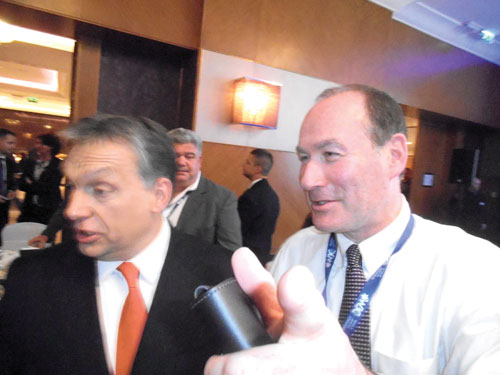.jpg)
Budapest—I participated in the recent World Jewish Congress’ quadrennial plenary, where the pressing issues of World Jewry were deliberated. Traditionally held in Jerusalem, this year, in recognition of the overt anti-Semitism experienced by Hungarian Jewry (as well as much of European Jewry), the plenary was held in Budapest.
Holocaust survivors and their children, myself included, often have an uncomfortable feeling in these “Jewish graveyards.” Even the general pleasantness of central Budapest along the Danube cannot obscure this. In just 90 days in the summer of 1944, 400,000 Jews were rounded up and deported to be gassed and murdered in Auschwitz. Despite the fact that the war would soon be lost for Germany (within 10 months as it turned out), Hitler’s and Eichmann’s obsession and efficiency meant that more Jews were murdered in this 90-day period than in any other similar time frame during the Holocaust. You see the apartments, particularly surrounding the majestic Dohaney Synagogue where the Jews resided, and you realize what it was like for 400,000 men, women and children—with the able assistance of their countrymen—to have been removed from their homes and sent to their deaths.
And so we gathered in the Intercontinental Hotel to discuss with our brothers and sisters, Jewish leaders from the US, Canada, South America, New Zealand and Australia, Swaziland, Namibia, Hong Kong, Venezuela, Kyrgystan, and Latvia—communities large and small—to discuss the status of world Jewry in the 21st century. We heard from our delegates, representatives of the European Union, representatives from Germany, America, Japan and other governments. To the credit of our WJC delegates, we strenuously engaged them (and they sometimes avoided candid, obvious and honest responses as diplomats do) on the rise of European Nazi parties, the Islamists /Muslim anti-Semitism, curbs on Jewish religious practice and support for Israel in her struggle to keep her people safe as she remains surrounded by Brotherhood/Islamist/misogynist/anti-Semitic/anti-Christian /tribal regimes.
The gathering was equally disquieting and heartwarming. On the positive side, one cannot fail to pay tribute to the dedication and selflessness of Ron Lauder. His largesse and its deployment for the benefit of world Jewry—in contrast to those who either neglect their brethren in their philanthropy or actually underwrite causes which do us great harm—is stunning.
The programs and the venues distinctly bore the imprimatur and generosity of Ron. As a result, we were gathered in the heart of Central Europe in an exhibition of dignity and determination, diminished only by some of the inefficiencies of the Hungarian government and security services. Our Monday evening dinner was served in the exquisitely decorated gymnasium at the 600-student Lauder Javne School, and the students entertained us. It was a highlight that left us full of emotion and deep gratitude. Who knows what would have become of these talented, poised and bright Jewish students in Budapest and elsewhere in central and Eastern Europe without the Ronald Lauder Foundation?
On the negative side, we were aware that the government had restricted anti-Semitic, pro-Jobbik demonstrations while we were in session in Budapest so that they could not stick their obscenities in our faces. Nonetheless, we were well aware of these events, and we knew that a member of parliament demanded that a list be drawn up of Jews in the government—and we knew there was even more sub-rosa hatred being aimed at the Hungarian Jews and Roma.
On Friday evening we enjoyed a beautiful dinner following services in the majestic Dohaney Synagogue. Congregational attendance is rather small except at Rosh Hashana and Yom Kippur. In general, for security, the police had us walk in rows from place-to-place as a group with police protection. (Individuals, discretely and not wearing WJC credentials, did explore the city on their own).
We heard of numerous anti-Semitic incidents from the Hungarian delegates at our conclave, but we also were given a small taste of what was going on. Unlike our Hungarian brothers and sisters, we were well-protected. A group of us heard a derisive rendering of “Hava Nagila” as we passed some youths in the park. Another group was asked by some youths for a cigarette. Told by the police escort to ignore them, the group proceeded to shout, “You should all have been gassed at Auschwitz!” When a police supervisor told the offending youths not to “speak that way,” they told him, in Hungarian, to commit a physically impossible act. Two officers beat the youths into the ground.
Members of the Hungarian delegation indicated that that this was a show of force to impress us and that the beating was not because the hooligan wants Jews in Auschwitz, but because of what they told the police to do.
Most of us believed that Prime Minister Orban was responsive to our concerns when he addressed our dinner on Sunday. However, the Hungarian delegates were not convinced. I spoke briefly with the prime minister and recalled our conversations when Orban was a young prime minister in the mid 1990’s, and I was working for New York State Governor George Pataki, who is of Hungarian descent. Perhaps the former governor will set him straight, because Hungarian delegates and other Jews we met told us that Orban is passive in the light of bigotry against Jews [and Roma] because he wants the anti-Semitic Jobbik Party’s votes. They said to me about his dinner presentation, “You were somewhat pleased by Orban’s statements; we were pleased when he left.”
Our brethren in Europe are on the front lines, just like our Israeli brethren. For the comparative security we still enjoy here, we owe it to world Jewry to be involved, vigilant and generous.
Jeffrey S. Wiesenfeld is a delegate, American Section, of the World Jewish Congress; a former aide to Governor George Pataki, Senator Alfonse D’Amato, Mayor Ed Koch, and a CUNY Trustee; he is a NY-JCRC Board Member; Chairman of the Board of the National Yiddish Theatre, and a principal at Sanford Bernstein.
By Jeffrey S. Wiesenfeld










